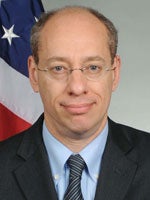The Federal Trade Commission is not just an agency, said its Chairman Jon Leibowitz at a talk on Thursday, Oct.11 at Harvard Law School, but it is an agency of superheroes, working to protect American consumers.
“Like Superman, we fight for truth and justice and the American way—but of course we don’t wear capes,” Leibowitz said.
At the talk, Leibowitz explained what the FTC does and how it protects consumers, peppering his speech with examples of enforcement actions and references to superheroes. He also encouraged students to work in the public sector, which he said provides a kind of “psychic income” and said the FTC will soon be establishing an entry-level honors hiring program.
The FTC, he said, works to protect consumers and promote competition in the market. It is independent, bipartisan – only three of the FTC’s five commissioners at a given time can be from the same party – and relatively insulated from the vagaries of public opinion, he said.
Some of the FTC’s recent successes, Leibowitz said, have been the institution of the Do Not Call registry as well as a $478 million judgment against the marketers of several infomercial-based get-rich-quick scams – the largest litigated judgment ever won by the agency.
The Commission also works on online regulation and privacy protection, in a number of capacities. Currently, Leibowitz said, his office is working on a “do-not-track” program that would prevent advertisers from tracking users’ online activity. Critics have argued this would destroy online advertising, but Leibowitz countered that destruction is neither the intent of the program nor will it be its effect. People like targeted advertising, he said, and they enjoy the free content enabled by that advertising.
“It’s about giving individuals more choice about where their personal information is going to go,” he said.
Similarly, in an illustration of how the FTC influences policy in addition to enforcing rules, Leibowitz explained a recent initiative to protect the online privacy of children. Developers of applications, he said, typically do not have privacy policies in place. The platforms – such as Facebook or Apple – have not been paying attention, and it is not possible to go after every single developer. The FTC produced a report on the issue last spring, Leibowitz said, and now the platform companies are doing a better job of ensuring that mechanisms are in place to protect the privacy of child users.
Outside of online privacy, the FTC is also working to address a pharmaceutical scheme in which a company holding the patent on a drug pays generic manufacturers to stay out of the market for a specified period of time, even after patent protection has expired. These “pay for delay” schemes, Leibowitz said, prevent people from obtaining affordable generic drugs, and result in an extra $3.5 billion per year in higher health care costs. The FTC has been targeting the deals since their inception, he said, and pharmaceutical executives have even told him privately that they think he is right. Still, the federal circuit courts are split on whether the deals are illegal, he said, and so the FTC will soon be taking the matter to the Supreme Court.
“We’re going to continue this fight until we win,” Leibowitz said, invoking his superhero metaphor once again. “Affordable health care hangs in the balance.”
Confronting the pharmaceutical schemes is evidence of what Leibowitz said is the FTC’s overall approach: to provide the “greatest good for the greatest number of people.” Limited resources mean the commission must take only the best cases and leverage every case it brings, he said. And even though, as one audience member said, it may seem that there are always more scams and schemes out there, Leibowitz is not discouraged.
“If we weren’t involved, if there was no consumer protection…we’d be a worse off society,” he said.
